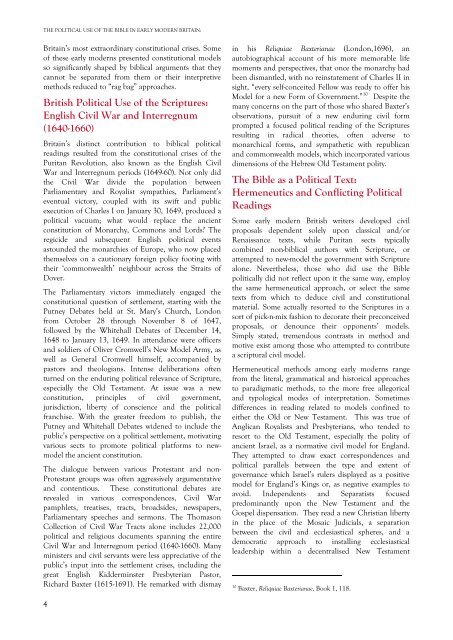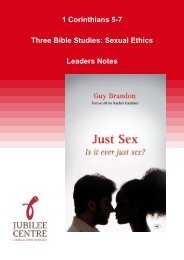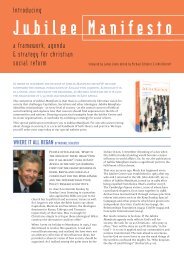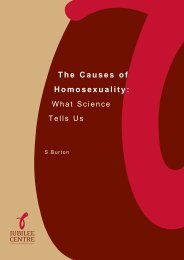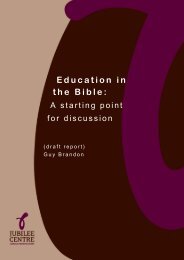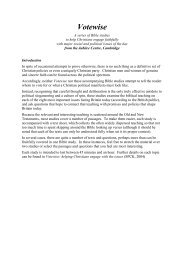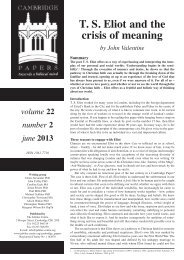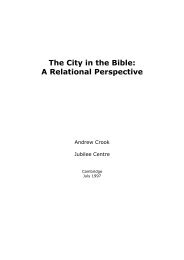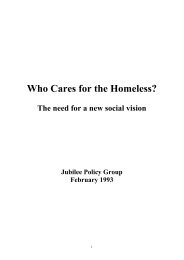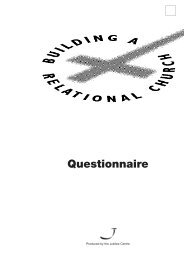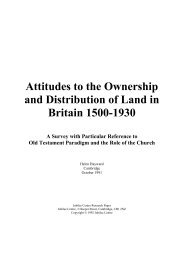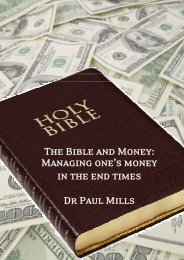Report Template - Jubilee Centre
Report Template - Jubilee Centre
Report Template - Jubilee Centre
Create successful ePaper yourself
Turn your PDF publications into a flip-book with our unique Google optimized e-Paper software.
THE POLITICAL USE OF THE BIBLE IN EARLY MODERN BRITAIN:<br />
Britain’s most extraordinary constitutional crises. Some<br />
of these early moderns presented constitutional models<br />
so significantly shaped by biblical arguments that they<br />
cannot be separated from them or their interpretive<br />
methods reduced to “rag bag” approaches.<br />
British Political Use of the Scriptures:<br />
English Civil War and Interregnum<br />
(1640-1660)<br />
Britain’s distinct contribution to biblical political<br />
readings resulted from the constitutional crises of the<br />
Puritan Revolution, also known as the English Civil<br />
War and Interregnum periods (1649-60). Not only did<br />
the Civil War divide the population between<br />
Parliamentary and Royalist sympathies, Parliament’s<br />
eventual victory, coupled with its swift and public<br />
execution of Charles I on January 30, 1649, produced a<br />
political vacuum; what would replace the ancient<br />
constitution of Monarchy, Commons and Lords? The<br />
regicide and subsequent English political events<br />
astounded the monarchies of Europe, who now placed<br />
themselves on a cautionary foreign policy footing with<br />
their ‘commonwealth’ neighbour across the Straits of<br />
Dover.<br />
The Parliamentary victors immediately engaged the<br />
constitutional question of settlement, starting with the<br />
Putney Debates held at St. Mary’s Church, London<br />
from October 28 through November 8 of 1647,<br />
followed by the Whitehall Debates of December 14,<br />
1648 to January 13, 1649. In attendance were officers<br />
and soldiers of Oliver Cromwell’s New Model Army, as<br />
well as General Cromwell himself, accompanied by<br />
pastors and theologians. Intense deliberations often<br />
turned on the enduring political relevance of Scripture,<br />
especially the Old Testament. At issue was a new<br />
constitution, principles of civil government,<br />
jurisdiction, liberty of conscience and the political<br />
franchise. With the greater freedom to publish, the<br />
Putney and Whitehall Debates widened to include the<br />
public’s perspective on a political settlement, motivating<br />
various sects to promote political platforms to newmodel<br />
the ancient constitution.<br />
The dialogue between various Protestant and non-<br />
Protestant groups was often aggressively argumentative<br />
and contentious. These constitutional debates are<br />
revealed in various correspondences, Civil War<br />
pamphlets, treatises, tracts, broadsides, newspapers,<br />
Parliamentary speeches and sermons. The Thomason<br />
Collection of Civil War Tracts alone includes 22,000<br />
political and religious documents spanning the entire<br />
Civil War and Interregnum period (1640-1660). Many<br />
ministers and civil servants were less appreciative of the<br />
public’s input into the settlement crises, including the<br />
great English Kidderminster Presbyterian Pastor,<br />
Richard Baxter (1615-1691). He remarked with dismay<br />
in his Reliquiae Baxterianae (London,1696), an<br />
autobiographical account of his more memorable life<br />
moments and perspectives, that once the monarchy had<br />
been dismantled, with no reinstatement of Charles II in<br />
sight, “every self-conceited Fellow was ready to offer his<br />
Model for a new Form of Government.” 10 Despite the<br />
many concerns on the part of those who shared Baxter’s<br />
observations, pursuit of a new enduring civil form<br />
prompted a focused political reading of the Scriptures<br />
resulting in radical theories, often adverse to<br />
monarchical forms, and sympathetic with republican<br />
and commonwealth models, which incorporated various<br />
dimensions of the Hebrew Old Testament polity.<br />
The Bible as a Political Text:<br />
Hermeneutics and Conflicting Political<br />
Readings<br />
Some early modern British writers developed civil<br />
proposals dependent solely upon classical and/or<br />
Renaissance texts, while Puritan sects typically<br />
combined non-biblical authors with Scripture, or<br />
attempted to new-model the government with Scripture<br />
alone. Nevertheless, those who did use the Bible<br />
politically did not reflect upon it the same way, employ<br />
the same hermeneutical approach, or select the same<br />
texts from which to deduce civil and constitutional<br />
material. Some actually resorted to the Scriptures in a<br />
sort of pick-n-mix fashion to decorate their preconceived<br />
proposals, or denounce their opponents’ models.<br />
Simply stated, tremendous contrasts in method and<br />
motive exist among those who attempted to contribute<br />
a scriptural civil model.<br />
Hermeneutical methods among early moderns range<br />
from the literal, grammatical and historical approaches<br />
to paradigmatic methods, to the more free allegorical<br />
and typological modes of interpretation. Sometimes<br />
differences in reading related to models confined to<br />
either the Old or New Testament. This was true of<br />
Anglican Royalists and Presbyterians, who tended to<br />
resort to the Old Testament, especially the polity of<br />
ancient Israel, as a normative civil model for England.<br />
They attempted to draw exact correspondences and<br />
political parallels between the type and extent of<br />
governance which Israel’s rulers displayed as a positive<br />
model for England’s Kings or, as negative examples to<br />
avoid. Independents and Separatists focused<br />
predominantly upon the New Testament and the<br />
Gospel dispensation. They read a new Christian liberty<br />
in the place of the Mosaic Judicials, a separation<br />
between the civil and ecclesiastical spheres, and a<br />
democratic approach to installing ecclesiastical<br />
leadership within a decentralised New Testament<br />
10<br />
Baxter, Reliquiae Baxterianae, Book 1, 118.<br />
4


